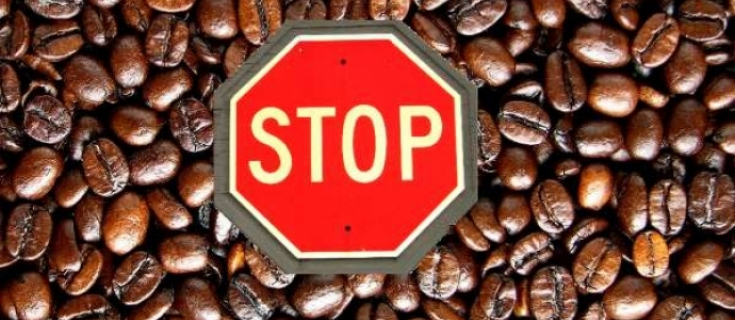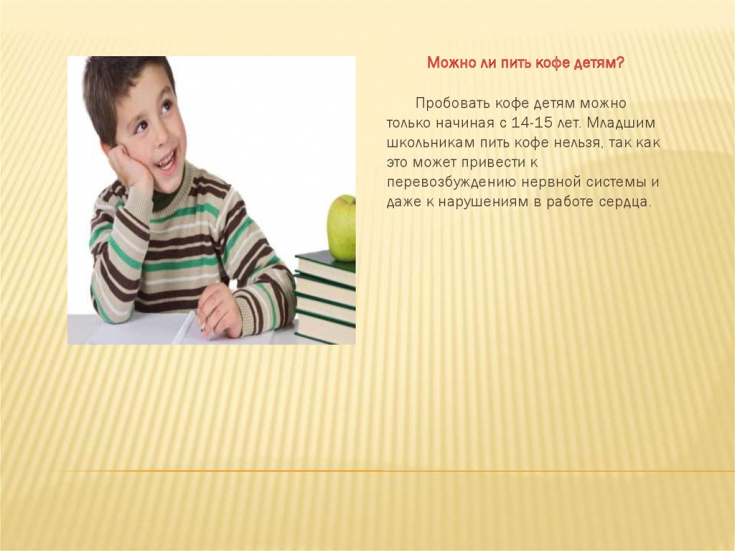Food interest appears in children long before the first words, they are interested in everything that their parents eat. It is not surprising that at 3-4 years old the baby does not understand why mom and dad drink tea and coffee, but he can’t. The menu of kindergartens, schools includes a coffee drink, cocoa for an afternoon snack. The unanimous opinion of doctors on the issue of – can children drink coffee or not – did not work out. Some argue that at the age of 8 it is permissible to drink a crumb with a mixture of coffee and milk. Other – we are sure that such drinks are unacceptable in the diet of children under 15. Caffeine, which worries caring mothers, is contained in chocolate, cocoa, and black tea.
estet-portal.com will tell how coffee affects the children's body,
Children's body – forms and grows up to a certain age, the reaction to new products on the menu is different: from food allergies to poisoning. Everything is introduced gradually in small doses. Coffee – a drink that contains more than a hundred chemical compounds. For adults, neutralizing the harmful effects of the elements will not be a problem, but the baby will suffer.
According to studies, even one glass of coffee with milk is harmful for a 6-year-old child. After drinking the drink, the children became hyperactive, and by the end of the day they were completely exhausted. The entire supply of energy is consumed in 4 hours, the kids get tired, become lethargic before noon.
What to give your child to school: snack ideas for schoolchildren

Coffee contains: caffeine, citric acid, tartaric acid, malic acid, fats, sucrose. Robusta contains twice as much caffeine as Arabica. Benzopyrene – substance in coffee – is carcinogenic.
Subscribe to our page on Facebook!
Perks of drinking a drink, for school-age children:
• brain stimulant;
• improves the memorization of information, relieves the feeling of fatigue;
• increases physical activity;
• with attacks of allergies, asthma facilitates tolerance;
• activates the metabolic processes of the gastrointestinal tract;
• improves the emotional state, accelerates the reactions of the body.
But the beneficial characteristics of caffeine do not mean that children can drink coffee. There are more disadvantages that affect the proper functioning of the body.
The following negative properties of coffee are recognized:
• emotional instability – the baby becomes whiny, reacts sharply, then laughs, then suddenly cries;
• coffee leaches calcium from the body, which is involved in the formation of bone tissue;
• changes the hormonal background, inhibits the production of some hormones, the growth of others; addictive;
• sleep disturbance, children wake up several times during the night due to the excitability of the nervous system;
• increases heart rate, causes tachycardia.
When caffeine enters the body, gastric juice is produced under its influence, the process of digesting food is accelerated, the child feels hungry faster. For a snack, schoolchildren often choose a pie, a chocolate bar. These products do not carry anything useful – they have no vitamins, only calories. With a sedentary lifestyle in the classroom, they simply debug into excess adipose tissue. The likelihood of obesity in this case increases.
At what age can children drink coffee
If your little one wants to drink coffee to keep their interest, make them a chicory drink. It is not recommended to introduce caffeine before 7 years of age. After the allowable dose – 50 mg. If you add 15-25 ml of coffee to a cup of warm milk, nothing bad will happen. At the age of 7-11 years, coffee is strictly once a month. At 11-14 years old, it is allowed once a week, at breakfast, to exclude the appearance of insomnia. Avoid other caffeinated foods. Watch the reaction of the child's body, at the first taste of the drink. Nausea, dizziness, chills – symptoms that require immediate medical attention.
When coffee appears in the diet of your son or daughter, the main – Cut down on foods and drinks that are high in caffeine. Otherwise, this is fraught with an overdose of the substance, side effects. It is found in the following products:
• cocoa drink 1-5 mg in 100 ml;
• coca-cola 10.5 mg in 100 ml; • dark chocolate 45-78 mg per 100 g;
• milk chocolate 20-23 mg per 100 g;
• black tea 5-30 mg in 100 ml; • green tea 9-20 mg per 100 ml.
If parents have a great desire to delay the moment of caffeine use by children, this will not work. It is part of the products that are popular among schoolchildren. Sooner or later, the kid will try them: at a party, in the school canteen, peers will treat him.
Children's Cocoa Recipe
Introduce children to light cocoa drinks. Do not buy powders that are simply diluted with water, better – cook yourself. For the base, choose milk, not water, it will taste better.
You will need 2 teaspoons of cocoa powder, the same amount of sugar, 250 ml of milk. Mix the dry ingredients, heat 2 tablespoons of milk, then pour into the dry mixture. Stir, sugar should dissolve. Add the remaining milk, put on fire, cook for about 5 minutes, do not boil.
Drinking cocoa is recommended no more than once every two weeks, because. it also contains caffeine. It is important that there is no allergic reaction. Such a drink is considered high-calorie, so overweight children should not be given it.
Can children drink coffee or not – The decision is made by the parents. Evaluate all the pros and cons of the drink. Sometimes it is better to endure a 5-minute tantrum of a child because he did not get what he wanted than to face health problems in the future.







Add a comment